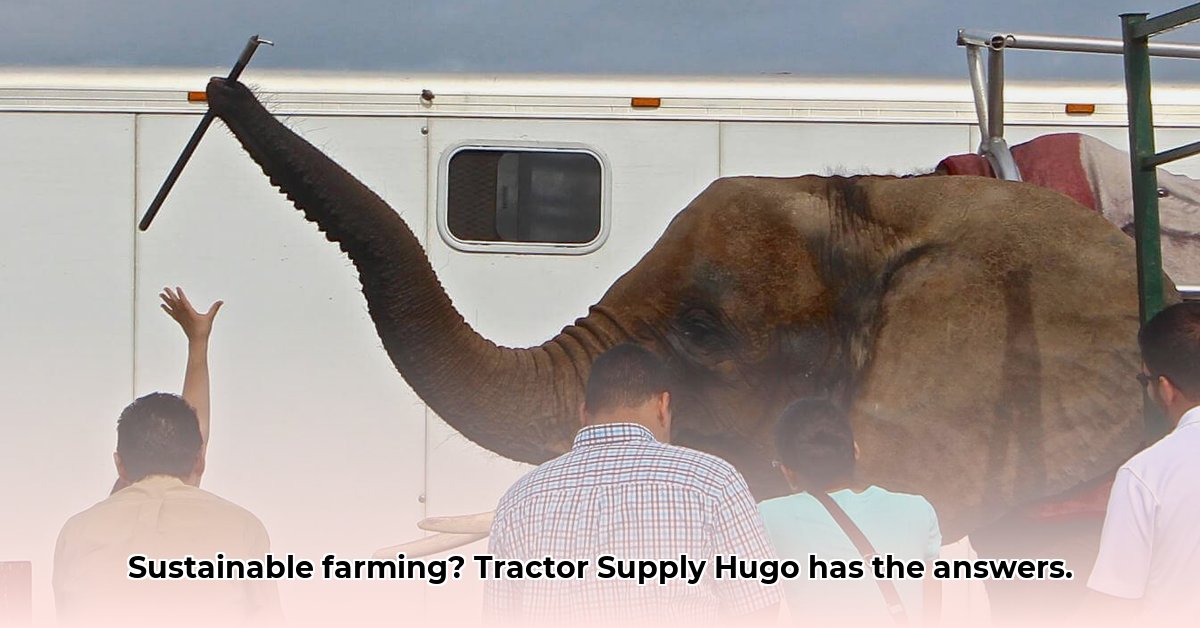
Tractor Supply (TSC) in Hugo, Oklahoma, plays a vital role in the local agricultural landscape, extending beyond simply providing supplies. For more information on sustainable fertilizer options, check out this resource. This case study examines TSC's contribution to sustainable farming, highlighting both its successes and areas for improvement. We will explore how TSC Hugo supports local farmers, the challenges faced in promoting sustainable practices, and the opportunities for a brighter, more environmentally responsible future.
TSC's Role in Sustainable Agriculture: A Comprehensive Look
TSC Hugo offers a wide array of products crucial to local farmers and ranchers. Beyond tractors and traditional farm supplies, the store stocks organic seeds, water-efficient irrigation equipment, and sustainably sourced animal feed. This diverse inventory directly supports environmentally conscious farming methods. But the store's impact goes beyond its product offerings. The knowledgeable staff, often possessing extensive agricultural experience, provides invaluable guidance to customers, assisting them in making informed decisions that benefit both their farms and the environment. This personalized service differentiates TSC from generic retailers, creating a genuine community resource. How can this model be replicated nationwide?
Challenges and Opportunities: Navigating the Path to Sustainability
While TSC Hugo makes significant contributions, challenges remain. Supply chain disruptions, competition from online retailers, and evolving consumer preferences present ongoing hurdles. However, these challenges also present opportunities for growth.
A key area requiring improvement is transparency regarding sustainability initiatives. Currently, there's a lack of clear, publicly available data on TSC's sustainability goals and progress. This lack of transparency hinders trust-building with environmentally conscious customers. Increased transparency is crucial, and readily available data (e.g., carbon footprint, sourcing information) is needed to demonstrate a genuine commitment to sustainability.
Here’s a look at key challenges and potential mitigation strategies:
| Challenge | Mitigation Strategy | Potential Benefits |
|---|---|---|
| Supply Chain Disruptions | Diversify suppliers, forge strong partnerships, explore local sourcing opportunities. | Increased resilience, reduced transportation costs and environmental impact. |
| Online Retail Competition | Enhance in-store experience (workshops, community events, personalized advice); build a robust loyalty program. | Creates a community hub, fosters personal connections, and boosts customer retention. |
| Evolving Consumer Preferences | Expand sustainable and ethically sourced products; clearly label eco-friendly choices. | Attracts environmentally conscious consumers, strengthens brand image and reputation. |
| Lack of Sustainability Data | Publish regular reports on progress towards specific, measurable, achievable, relevant, and time-bound (SMART) sustainability goals. | Builds trust, demonstrates commitment to environmental responsibility. |
The Hugo Perspective: A Community-Focused Approach
The TSC Hugo store offers a valuable case study. Its unique characteristics, such as its product selection tailored to local needs and its engagement with local agricultural organizations, should be analyzed in detail. Understanding the Hugo store's impact highlights potential best practices for replication throughout TSC's network. Does TSC Hugo engage in any community initiatives that actively support sustainable farming in the area? What are their success rates and what are the lessons learned?
Actionable Steps for a Sustainable Future
Collaboration is key to achieving greater sustainability within the agricultural sector. Here's a breakdown of actionable steps for various stakeholders:
1. TSC: Publicly commit to specific, measurable sustainability goals, regularly reporting progress to build consumer trust. Partner with local organizations to offer workshops on sustainable farming practices and sustainable product sourcing.
2. Small-Scale Farmers: Utilize TSC's resources, including staff expertise, to learn about and implement sustainable farming practices. Active engagement with TSC's educational offerings will increase the efficiency and sustainability of their farming methods.
3. Consumers: Support businesses exhibiting a genuine commitment to sustainability through conscious purchasing decisions. Demand transparency regarding supply chains and sourcing practices. This market demand is a catalyst for change.
4. Local Government: Collaborate with TSC and local farmers, offering financial incentives and training programs to promote sustainable agriculture initiatives. Active partnership generates the most significant impact on sustainability efforts.
Conclusion: Fostering a Sustainable Agricultural Ecosystem
Tractor Supply Hugo serves as a microcosm of the broader agricultural landscape. By embracing transparency, investing in education, and actively fostering partnerships, TSC can significantly increase its positive impact on sustainable farming practices. The future of agriculture relies on collaborative efforts, and TSC's role in this transformation is crucial. The success of TSC's sustainability strategy depends upon all stakeholders actively participating in creating a more sustainable future.